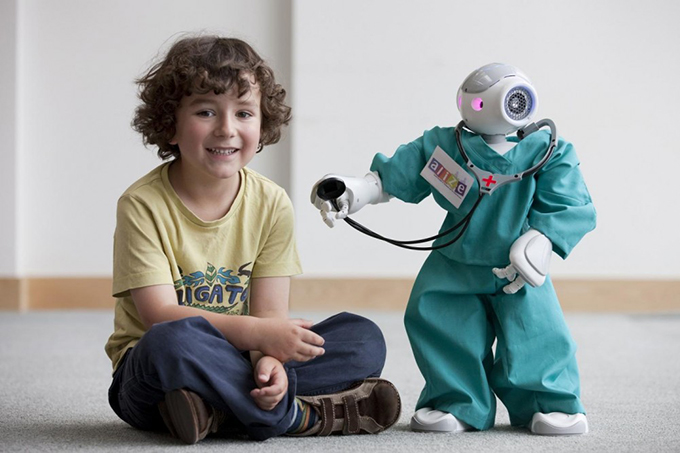
Social robots appear to be entities with feelings and relational capacity. They are technologies with pretensions to be social as people and other animals. Social robots do not use them, we relate to them. Your ability to address us on our own terms is the basis of your wonderful potential. However, it also involves certain concerns that are interesting to know.
Artificial sociality
Social robots have a particularity to have a body. This physical reality that gives them a potential emotional impact on us far superior to that of their digital colleagues.
His appearance and behavior-gestures, language, expressions-lead us to attribute intentions, emotions, understanding or empathy. They are designed to attract and engage us with their biologically inspired appearance and behavior. To a certain extent, we see them similar to ourselves. At a deep level we recognize them, so the interaction with them becomes more natural and intuitive.
Thanks to these social capacities, they are increasingly present in any area of our public and private lives. They are out of the laboratories and providing their services in such sensitive environments as early childhood education, therapy and the accompaniment of the elderly. Specific social robots are designed for education, for treatments of certain disorders, to keep company. Some of these robot-based interventions have had very promising results.
But, surprisingly, we still know very little about the emotional effects that social robots cause us. There are still few voices discussing the convenience or not of generalizing the deal with artificial agents. Is not a subject sufficiently controversial? Do not robots have a huge transformational impact on our relationships, our affections and our thoughts?
Fortunately, the scientific community of human-robot interaction has long been discussing ethical considerations . We should analyze among all if these links with robots can really contribute to a good life .
With the accumulated knowledge, we already know that our relationship with robots causes, together with wonderful utilities, undesirable effects, some of which I would like to point out here.
Some challenges that we should face
- Excessive exposure in children . Being in touch with social robots could compromise the healthy development of young children. For example, a process as critical as moral development occurs above all from the interaction between equals. Reciprocity sets in motion attitudes as important as concern for the welfare of others and the construction of values such as equality, equity and justice. Children who grow up with robots know that they are objects and, therefore, morally inferior since they are the product of human creation. Will they transfer the dominant mode of interacting with robots to dealing with another human being?
- Deceitfulness . Studies show that people exposed to social robots quickly form representations of the minds of robots. We attribute them social entity and impute them in a more or less naive way feelings and intelligence that they do not have. Is not there something morally dubious about deceiving humans and making them think that they can establish meaningful interactions with an object? Or is it just an inevitable logical step in our technological civilization? Would it be possible to become friends with robots? Are friendships between humans and robots desirable? What implications will this have on future generations, which will grow in the daily presence of robots? How will it affect human friendships?
- Clinging . Is it justifiable from an ethical standpoint to build a robot that causes discomfort and regret by turning it off? Is it appropriate to design a robot that is so attractive that people get attached to it emotionally, forming a relationship comparable to an interpersonal relationship? That his absence causes feelings of grief and longing?
- Interference with social relationships . Robots designed to be more acceptable by vulnerable populations, such as the elderly, can be more easily introduced into their environments. They can sometimes replace living beings. If this happens, the robot, pretending to provide company, would become an isolation factor. If we finally accept these unidirectional emotional links with robots, will not this harm our relationships with other human beings?
- Interference with relationships with animals . Another one of the risks indicated by the experts is in altering the human-animal union. The density of artificial pets is growing in children’s lives. This situation can alter our propensity to affiliate with the natural world, since robots play the role of family pets. This situation could contribute to the growing disaffection with nature. What is really paradoxical is that these artificial creatures take advantage of our attraction to nature to imitate life, away from it.
There are many open questions and many concerns raised . We need more research and debate about how it affects us – as individuals and as a society – to interact with robots, to make the right decisions. We need to know more and be critical beyond our fascination with these creatures in order to design the robots that suit us and to use them responsibly.
Author Bio: Marta Díaz Boladeras is Professor and researcher specialized in human-robot interaction at Universitat Politècnica de Catalunya – BarcelonaTech
